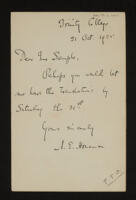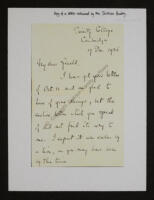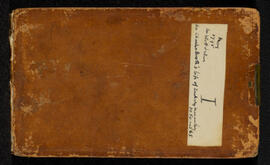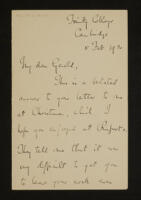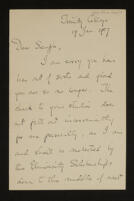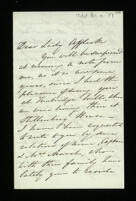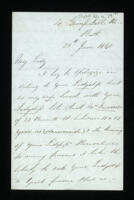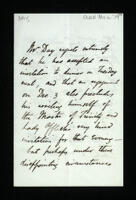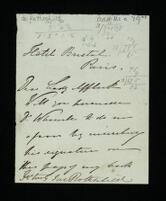(With an envelope.)
—————
Transcript
Trinity College.
21 Oct. 1925
Dear Mr Semple,
Perhaps you would let me have the translations by Saturday the 31st.
Yours sincerely
A. E. Housman.
I. 5. 10: Transalpino—uisum
[I.] 11. 8: perge—desistant
[I. 11.] 10: par—geminatis
[I. 11.] 13: obiecta—cassauerimus
[I. 11.] 15: contionatoris mei
II. 2. 1: iam uer … porrigitur
[II. 2.] 2: concaua—compressus
[II. 2.] 3: nisi—uerere
[III. 3.] 7: tamquam—truncatum
[III.] 14. 2: non amplius—rideat
IV. 11. 3: hinc etiam—laudabilis
[IV.] 21. 2: ecce habes—existimabis
[IV.] 22. 3: itaque—opportunitas
V. 8. 2: nisi quod—appenso
[V.] 10. 4: quapropter—adhiberi
[V.] 13. 1: iam Clausetiam—insorduit
[V.] 15. 2: restat—mercedem
[V.] 19. 1: nutricis—impunitatem
[V.] 20. 4: praeterea—uenitur
[V. 20. 4]: namque erit—uideris
VI. 12. 6: illum dubia—complesti
VII. 1. 4: miraculo—naturam
[VII.] 12. 4: haec omnia—adiungi
[VII.] 14. 11: nostram quoque—exhorruit
*[VII.] 15. 1: sed et ille—possessio {1}
VIII[.] 6. 2: insuper—supergressus
[VIII. 6.] 8: quid multa—audiui
[VIII. 6.] 16: dein, quod—fortuitis
[VIII.] 8. 2: redde te patri—affectus
[VIII.] 9. 3: ago laboriosum—impetro
[VIII. 9.] 5: lines 48–51
[VIII.] 11. 9.
[VIII.] 12. 7: quid multa—epulones
[VIII.] 16. 3: si refutamur―simpliciter {2}
IX. 2. 1: iubetis―incipitur
[IX.] 9. 13: huic copulatum―philosophari
[IX. 9.] 14: curua ceruice―cute distenta
[IX.] 13. 1: crederem―fallere
[IX] 16. 3: de reliquo―munerabor
[IX. 16. 3]: lines 33–36.
[On the back of the letter are some pencil notes, presumably by Semple.]
[Direction on envelope:] W. H. Semple Esq. | St John’s College
—————
The references in the postscript are to the letters of Sidonius Apollinaris, which are referred to by book, letter, and section. Elements of references repeated from the previous line are omitted in the MS, but they have been supplied above in square brackets. The colons in these references have also been supplied.
{1} The significance of the asterisk is unclear.
{2} Altered to ‘simplicitas’ in pencil.
